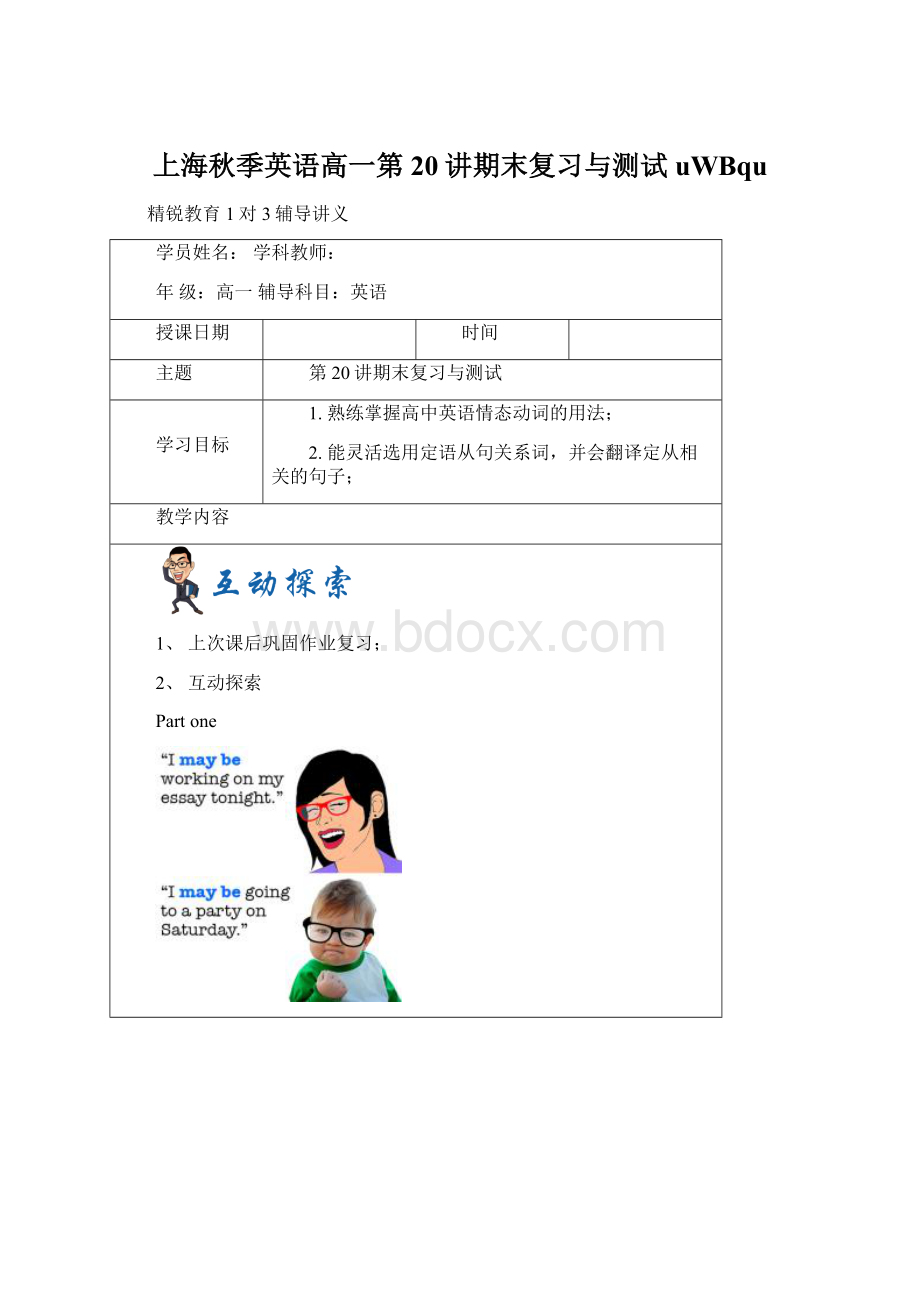上海秋季英语高一第20讲期末复习与测试uWBquWord文件下载.docx
《上海秋季英语高一第20讲期末复习与测试uWBquWord文件下载.docx》由会员分享,可在线阅读,更多相关《上海秋季英语高一第20讲期末复习与测试uWBquWord文件下载.docx(28页珍藏版)》请在冰豆网上搜索。

cannot/cannot
/can’tdo
Can…do…?
Yes,…can.
No,…can’t.
could
couldn’tdo
may
可以(问句中表示请求)
可能,或许(表推测)
祝愿(用于倒装句中)
maynotdo
May…do…?
Yes,…may.
No,…mustn’t/can’t.
might
mightnotdo
Might…do…?
Yes,…might
No,…mightnot.
must
必须,应该(表主观要求)
肯定,想必(肯定句中表推测)
mustnot/mustn’tdo
Must…do…?
Yes,…must.
No,…needn’t/don’thave
haveto
只好,不得不(客观的必须,有时态和人称的变化)
don’thavetodo
Do…havetodo…?
Yes,…do.
No,…don’t.
oughtto
应当(表示义务责任,口语中多用should)
oughtnotto/oughtn’ttodo
Ought…todo…?
Yes,…ought.
No,…oughtn’t.
shall
用于一三人称征求对方意见
用于二三人称表示许诺、命令、警告、威胁等
shallnot/shan’tdo
Shall…do…?
Yes,…shall.
No,…shan’t.
should
应当,应该(表义务责任)
本该(含有责备意味)
shouldnot/shouldn’tdo
Should…do…?
will
意愿,决心
请求,建议,用在问句中would比较委婉
willnot/won’tdo
Will/Would…do…?
Yes,…will.
No,…won’t.
would
wouldnot/wouldn’tdo
dare
敢(常用于否定句和疑问句中)
darenot/daren’tdo
Dare…do…?
Yes,…dare.
No,…daren’t.
need
需要,必须(常用于否定句和疑问句中)
neednot/needn’tdo
Need…do…?
Yes,…must.No,…needn’t.
usedto
过去常常(现在已不再)
usednot/usedn’t/usen’ttodo
didn’tusetodo
Used…todo…?
Did…usetodo…?
Yes,…used.
No,…use(d)n’t.
Yes,…did.
No,…didn’t.
【例题精讲】
例1.“Mikeisoftenabsentfromclass.”“Tellhimhe_____answerforitifhegoesonbehavinglikethat.”
A.shall
B.willC.would
D.can
【参考答案】A
【思路解析】shall用作情态动词主要有以下两个用法:
1)用于疑问句中征求意见。
如:
ShallIhelpyou?
要不要我帮帮你?
ShallIopenthewindow?
要我把窗子打开吗?
2)用于陈述句中表示允诺、告诫、警告、威胁、命令、规定、必然性等(可用于各类人称)。
Youshallsufferforthis.你会为此事吃苦头的。
(表威胁)
Eachcompetitorshallwearanumber.每个参赛者要戴一个号码。
(表规定)
Youshallheareverythingassoonasyoucome.你一来就可听到所有情况了。
(表允诺)
例2.You_______paytoomuchattentiontoyourreadingskill,asitissoimportant.
A.cannot
B.shouldn’tC.mustn’t
D.needn’t
【思路解析】cannot…too…是英语中一个十分有用的表达,意为“不可能太……,无论怎样……也不算过分,越……越……”。
Youcan’tbetoocareful.你越仔细越好。
Youcan’tpraisethebooktoomuch.这本书值得大加赞扬。
Wecannotworktoomuchforthepeople.我们为人民做工作是不可能做过头的。
Awomancannothavetoomanyclothes.女人买的衣服再多也不算多。
注意:
有时也可用cannever,impossible等与too连用来表示类似意思。
Itisimpossibletogettheretoosoon.去那儿越早越好。
例3.“IsJohncomingbytrain?
”“Heshould,buthe_____not.Helikesdrivinghiscar.”
A.must
B.canC.need
D.may
【参考答案】D
【思路解析】may表推测,maynot意为“可能不(会坐火车来)”。
句中的Heshould为Heshould
comebytrain之省略,由于其后出现转折连词but,说明语意有变化,再结合下文的Helikesdrivinghiscar,便可决定此题选D.注意,不能选B,因为can表示推测时通常不用肯定陈述句。
例4.“Iheardtheywentskiinginthemountainslastwinter.”“It____truebecausetherewaslittlesnowthere.”
A.maynotbe
B.won’tbeC.couldn’tbe
D.mustn’tbe
【参考答案】C
【思路解析】此题最佳答案为C,主要由下文的becausetherewaslittlesnowthere这一语境所决定,既然“没下什么雪”,那么“滑雪”就应是“不可能”,所以选couldn’tbe,即选C.
例5.You_____beright,butIdon’tthinkyouare.
A.can
B.could
C.must
D.should
【参考答案】B
【思路解析】从语境上看,C、D不宜选,在剩下的A和B中,许多同学想当然地选了A,认为整个句子为现在时态,所以选can,而不选过去式could,但是最佳答案却是B而不是A.按照英语语法,情态动词can用于推测表示可能性时,通常只用于否定句或疑问句中,而不用于肯定句中;
但could用于表推测时,却不仅可用于否定句和疑问句,也可用于肯定句,且此时的could并不是can的过去式,与can也没有时间上的差别,只是could比can语气更委婉,所以答案选B.
【巩固练习】
1.prosperousandstrong!
A.LetyourcountrybecomeB.Hopeyourcountrybecome
C.MayyourcountrybecomeD.Youcountryitbecoming
2.Petercomewithustonight,butheisn'
tverysureyet.
A.mustB.mayC.canD.will
3.—Ann,Ihavesomemorecake?
—Certainly,helpyourself.
A.needB.mustC.willD.may
4.—Excuseme,Iaskyouaquestion?
—Yes,please.
A.mustB.needC.mayD.would
5.Sincesheisangry,weheralone.
A.hadbetterleavingB.shouldleave
C.mightaswellleaveD.hadratherleave
【知识梳理2】
musthavedone
表示主观上对过去已经发生的行为进行推测,意为“想必,准是,一定做了某事”;
may/mighthavedone
表示对过去已发生行为的推测,意为“很有可能”;
can…havedone
cannothavedone
1)couldhavedone用于对过去可能性的推断,意为“可能”,在肯定句中,指“某事可能是事实或可能会发生”;
用于疑问句或否定句,表示对过去情况的怀疑、否定或惊讶;
2)couldhavedone意为“本来可以;
差点就要”,指“某事可能发生但实际上未发生”常用于虚拟语气,表示惋惜、遗憾等;
mighthavedone
表示“本来可能……,但实际上没有发生的事情”。
另外,还可以表示“本来应该或可以做某事”之意,含有轻微的责备语气。
should/oughtto
havedone
1)用于肯定句时,表示本该做某事,而实际上未做;
用于否定句时,则表示不该做的事反而做了;
2)用于对过去的推断,说话人认为“按理应当、理应如此”,说话人不能肯定,只是试探性地得出结论,语气婉转;
3)对已发生的事表示“惊奇、失望、愤怒”等情绪。
needn’thavedone
表示做了本来不必去做的事。
didn’tneedtodo表示“没必要做而实际上也没有做某事”
will/wouldhavedone
用于推测过去,意为“想必、可以肯定”,指“说话人确信某事已发生,但并不确知”,并用于二、三人称:
1)如果以现在为时间点,可以用“willhavedone”;
2)如果以过去为时间点,只能用“wouldhavedone”;
3)willhavedone也用于推测将来某个时间前已经完成。
例1.“Doyouthinkheislazy?
”“I_____soonce,butIdon’tnow.”
A.mayhavethought
B.canhavethought
C.maythink
D.mightthink
【思路解析】从答话人的语境可知,空格处的意思“曾经这样想过”,即对过去情况作推测,故应用“情态动词+动词完成式”;
又因为can表推测不用于肯定句,故选A.
例2.Theiranswersareexactlythesame—oneofthem______fromtheother.
A.mustcopy
B.musthavecopiedC.shouldcopy
D.shouldhavecopied
【思路解析】既然两人的答案完全一样,说明“抄袭”已经发生,故用“情态动词+动词完成式”,根据句意,应选B而不能选D.
例3.-Therewerealreadyfivepeopleinthecar,buttheymanagedtotakemeaswell.
-It_________acomfortablejourney.
A.can’tbeB.shouldn’tbeC.mustn’thavebeenD.couldn’thavebeen
【思路解析】A、B是对现在情况而言,与情景不合。
表否定推测不能说mustn’thavebeen,只有D选项“不可能是”意思切合,时态也对,故为正确答案。
例4.–Ican’tfindmypurseanywhere.
--You_______havelostitwhileshopping.
A.mayB.canC.shouldD.would
【思路解析】句意:
--我到处找不到我的钱包。
--你可能在购物的时候弄丢了。
根据句意首先排除C、D两项;
can表示实际的可能性时,只能用于否定句、疑问句,故B被排除;
A项表示推测时常用于肯定句。
1.Whereismypen?
Iit.
A.mightloseB.wouldhavelostC.shouldhavelostD.musthavelost
2.Thehouseisdarkandquiet,sotheBrownshavegonetobed.
A.mustB.shouldC.oughtD.would
3.—Mustwedoitnow?
—No,you.
A.needn'
tB.mustn'
tC.won'
tD.shouldn'
t
4.—Mustwetakeabus?
—No,you.Youcanwalkfromhere.
A.mustnotB.don'
tmustC.don'
thavetoD.hadbetternotto
5.—MayIstopworkingalittleearliertonight?
tC.can'
tD.don'
定语从句
【知识梳理1】定语从句的基本概念
定语从句起了形容词的作用,在句中修饰一个名词或代词。
被修饰的词叫做先行词,引导定语从句的词叫关系词,他的作用一是放在先行词与定语从句中间起了连接作用,二是在从句中担当一个成分,并与先行词保持数的一致。
关系词
先行词
从句成分
例句
备注
关系代词
who
人
主语
Doyouknowthemanwhoistalkingwithyourmother?
whom,which和that在从句中做宾语时,常可以省略,但介词提前时后面关系代词不能省略,也不可以用that
whom
宾语
Mr.SmithisthepersonwithwhomIamworking
Theboy(whom)sheloveddiedinthewar..
whose
人,物
定语
Ilikethosebookswhosetopicsareabouthistory.
Theboywhosefatherworksabroadismydeskmate.
that
主语,宾语
Aplaneisamachinethatcanfly.
Sheisthepopstar(that)Iwanttoseeverymuch.
which
物
Thebook(which)Igaveyouwasworth$10.
Thepicturewhichwasabouttheaccidentwasterrible.
as
Heissuchapersonasisrespectedbyallofus.
ThisisthesamepenasIlostyesterday.
as做宾语一般不省略
关系副词
when
时间状语
Iwillneverforgetthedaywhenwemetthere.
可用onwhich
where
地点
地点状语
ThisisthehousewhereIwasborn.
可用inwhich
why
原因
原因状语
Ican’timaginethereasonwhyheturneddownmyoffer.
可用forwhich
例1.Thereweredirtymarksonhertrousersshehadwipedherhands.
A.whereB.whichC.whenD.that
解析:
答案为A。
本题考地点状语从句,用where引导。
句意是“她的裤子上她擦过手的地方有脏痕”。
此处不能用时间状语从句,排除C,本题易被误认为考定语从句,意为“在她擦过手的裤子上有脏痕”。
定语从句修饰trousers,也只能用where。
B和D可引导定语从句,但只作主、宾等成分。
定语从句缺少状语,不缺主语、宾语,故不可用。
1.Isthisthebookyouwantedtoborrowlasttime?
Whichofthefollowingiswrong?
A.whichB.thatC.theoneD./
2.IsthisthecalculatoryouborrowedfromJane?
A.oneB.theonewhatC.theoneD.which
3.Canyoutellmethenameofthemuseumyouvisitedlastmonth?
A.whatB.whereC./D.when
4.Thetwothingstheyfeltveryproudweretheirhouseandthediamondring.
A.aboutwhichB.ofwhichC.inwhichD.forthat
5.Theyshowedusaroundthefactorywasequippedwithmodernmachines.
A.whereB.whatC.inwhichD.which
6.Haveyoueveraskedhimthereasonmayexplainhisabsence?
A.whyB.whenC.thatD.what
7.ThisistheTVstationwevisitedlastyear.
A.whereB.thatC.towhichD.inwhich
8.AreyoupleasedwithIhavesaid?
A.thatB.allthatC.allwhatD.allwhich
【知识梳理2】that与which,who,whom的用法区别
情况
用法说明
只用that的情况
1.
先行词为all,everything,anything,nothing,little,much,等不定代词时。
2.
先行词被all,any,every,each,much,little,no,some,few等修饰时
3.
先行词有形容词最高级和序数词修饰时
4.
先行词既指人又指物时
5.
先行词被theonly,thevery修饰时
6.
句中已经有who或which时,为了避免重复时
1.Hetoldmeeverythingthatheknows.
2.Allthebooksthatyouofferedhasbeengivenout.
3.ThisisthebestfilmthatIhaveeverread.
4.Wetalkedaboutthepersonsandthingsthatweremembered.
5.HeistheonlymanthatIwanttosee.
6.Whoisthemanthatismakingaspeech?
只用which,who,whom的情况
在非限制性定语从句中,只能用which指代物,用who/whom指人
在由“介词+关系代词”引导的定语从句中,只能用which指物,whom指人。
先行词本身是that时,关系词用which,先行词为those,one,he时多用who。
Hehasason,whohasgoneabroadforfurtherstudy.
Ilikethepersontowhomtheteacheristalking.
Thosewhorespectothersareusuallyrespectedbyothers.
1.Americanwomenusuallyidentifytheirbestfriendassomeonetheycantalkfrequently.
A.whoB.asC.aboutwhichD.withwhom
2.MyglassesIwaslikeablindman,felltothegroundandbroke.
A.whichB.withwhichC.withou